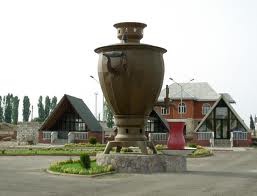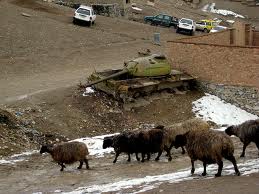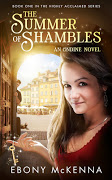
I hope you all enjoy this chance to learn something about a hitherto little known corner of our world and perhaps add Brugel to your tourist destinations on your next trip to Europe?
And if you're wondering why Brugel is not in this year's Eurovision it's because the Brugel organising committee (the BBC - Brugel Broadcasting Committee) missed the email from the EBU. They forgot to check the spam filter.
Then they got in after Romania was disqualified but were disqualified for breaching EBU (European Broadcasting Union) regulations about livestock on stage following their entrant's proposal to milk Snow Goats live on stage and protests from animal rights activists.
(For more about BRUGELESE SNOW GOATS, click HERE)
 A public samovar in downtown Venzelemma
A public samovar in downtown Venzelemma Oh yes, the Brugelish love of tea goes foot-in-boot with Russia. Samovari (the Brugelish name for one who prepares tea from a samovar) are more popular than Baristas in downtown Venzelemma.
Tea has always been a favourite of Brugelers. Coffee did gain a small foothold, but during the communist years, when Brugel was part of the USSR, Coffee became incredibly hard to obtain. The neighbouring state of Craviç tried growing Chicory as a substitute. Vile stuff. People switched back to tea, as this was easy to obtain through trade routes with China.
In Brugel, tea is often taken with a slice of lemon, rather than milk. This leads to the local idiom - I’ll take it with a slice of lemon - meaning you don’t entirely believe them. The more popular western phrase, “I’ll take that with a grain of salt” makes no sense in Brugel, as tea with salt tastes horrid.
 Monument to the Russian occupation in central Venzelemma
Monument to the Russian occupation in central Venzelemma Would you care to give us a potted version of Brugelese History?
Brugel has a marvellous and yet conveniently ignored history.
Settlement in the region can be traced back to nomadic goat herding tribes wandering through (on their way to better pastures) from at least 10,000 BC.
Historians are still vibrantly discussing the ensuing 12,000 years of Brugelese (or Brugelish, depending on which team you’re on) history. At a town called D’senterie, in the northernmost part of Brugel there is a historical marker dedicated to the place where Napoleon’s army rested for an afternoon. They picked Brugel Oak nuts and crushed them for a delicious sauce to dress the boiled chicken. This is also the first recorded outbreak of gastric upset in the Napoleonic Campaign.
Brugel has survived through many hardships, having been annexed into the Constantine, Austro-Hungarian, Prussian and Holy Roman empires at various – and mercifully short – times in history. In the 1950s Soviet tanks often rumbled through the main streets of Venzelemma – on their way to somewhere else.
It’s a little known fact that Brugel is the home of the sundial. This was more by tradition than design, from the days when sensible folk would abstain from drinking before the shadow of the castle tower cleared the main road.
The latest campaign from the Brugel Tourism Board is, “The Weekend Starts on Wednesday.” BrugelAir has free one-way flights to Venzelemma from Prague, every Wednesday for the foreseeable future. Unfortunately, there are no return flights, but I hear the train journeys to Slaegal the following Tuesday evoke equal measures of nostalgia and sciatica.
There are so many wonderful highlights; it’s hard to know where to start. Probably the most beautiful part of Brugel is the beach. (Singular, Brugel only has one). This one-hundred-metre-long strip of waterfront at the Black Sea is a charming way to fill a half hour on a summer morning.
It’s best to head into Venzelemma for the rest of the day, as the fishing boats return with their catches around ten and are not refrigerated.
Hiking is a popular pastime, as Brugel has the most manageable hills in all of Europe. Mt Verka Seduchka is the highest point, at a mighty 200 metres above sea level. It is also home to the transmission tower for BTV. The tower’s crumbling foundations and acute lean make for some dramatic photographs.

I can attest that these are not just books for youngsters. They had me laughing out loud ... most undignified I know (and somewhat alarming for my husband) ... but there you go. Sometimes you just find something that tickles the funnybone!
ABOUT EBONY...
Ebony McKenna lives in Melbourne, Australia with her family, living the slob-urban dream. She loves trivia nights, train sets and the Eurovision Song Contest. Despite having such a deep and abiding love for ferrets, her only pets are two RSPCA-rescue rabbits and the ring-tail possums that keep getting into the roof. Connect with Ebony at her WEBSITE and Facebook
To celebrate Eurovison
THE SUMMER OF SHAMBLES
Book 1 in the Ondine Stories is currently
**FREE**

 RSS Feed
RSS Feed